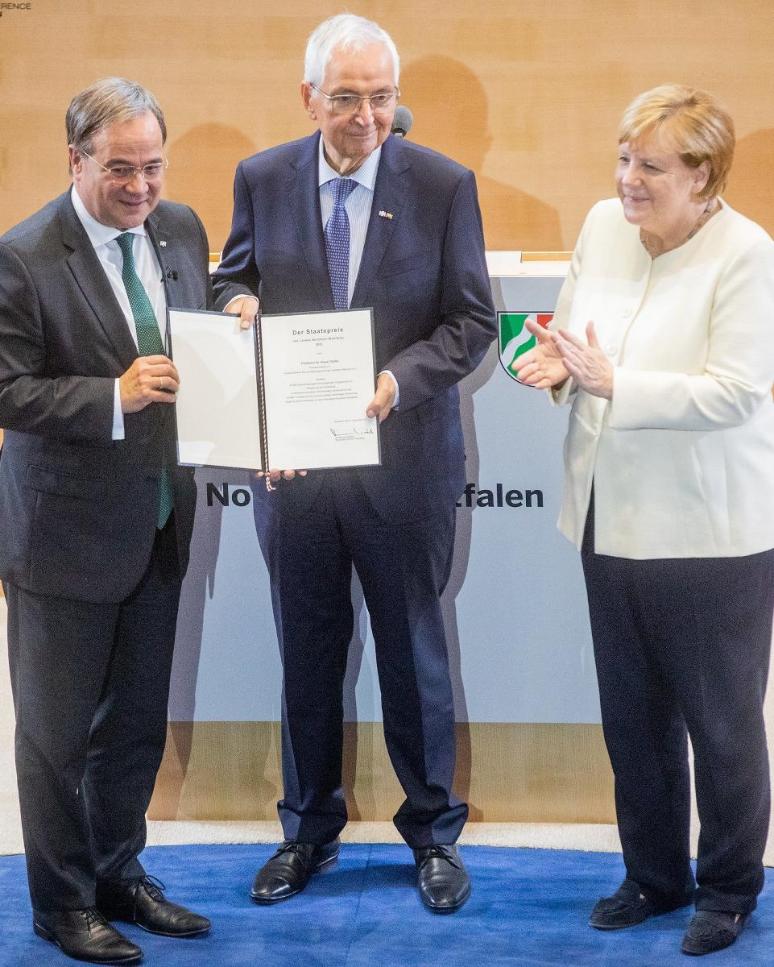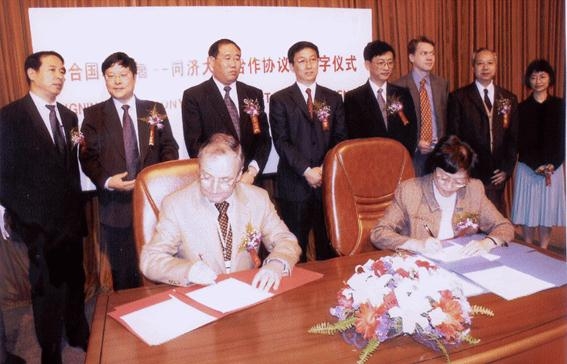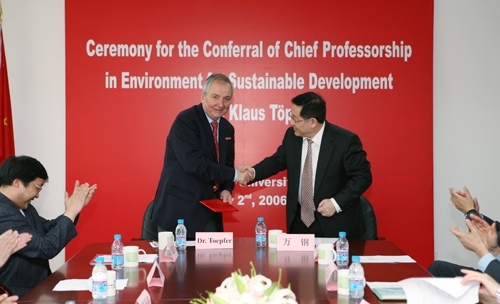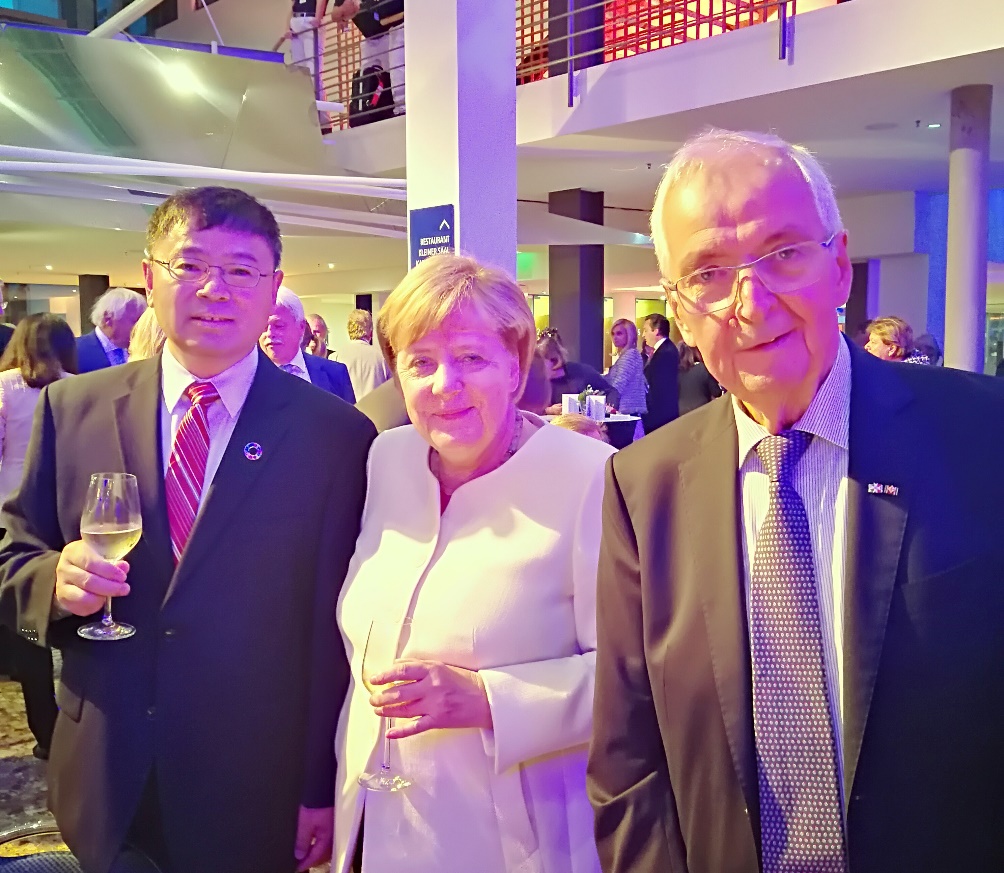On September 16th, Klaus Töpfer, honorary professor of Tongji University, former Under-Secretary-General of the United Nations (UN) and former executive director of the United Nations Environment Programme (UNEP), won Germany’s highest award, North Rhine-Westphalia Award in Bonn. German Chancellor Merkel attended and presented the award to Dr. Töpfer.

In her speech, Merkel pointed out that Germany's political environment, which attached great importance to climate policy nowadays, owes much to Dr. Töpfer 's early work. Dr. Töpfer is a well-respected thinker and doer with a strong vision and was the first one to promote the energy transition in Germany.
The North Rhine-Westphalia State Prize is the highest award in Germany. It is the first time that this prize has been awarded to people who have global influence due to significant contributions to climate policy.

In 2002, Töpfer, the former Under-Secretary-General of the United Nations (UN) and former Executive Director of the United Nations Environment Programme (UNEP), and Wu Qidi, the former President of Tongji University, signed an agreement to jointly establish the United Nations Environment Programme -Tongji Institute of Environment for Sustainable Development (IESD). For 17 years, Dr. Töpfer has been guiding and caring about the work of the college and the cooperation with Tongji University. He won the China National International Cooperation Award, the Chinese Government’s "Friendship Award" and the Shanghai Magnolia Award, and established the Töpfer Environmental Scholarship in Tongji University.
In 1998, Tongji University formally hired Dr. Töpfer as an honorary professor. His work in promoting the globalization of education and scientific research for environmental and sustainable development in China and Shanghai: initiated the establishment of our country’s first internationalized environment and sustainable development education talent training and scientific research platform-IESD; promoted IESD Disciplinary construction is responsible for the global environment and sustainable development education and talent training; promotes the globalization of IESD's scientific research, and promotes the international exchanges of our country's environment and sustainable development.

In 2006, Wan Gang, then president of Tongji University, awarded Dr. Töpfer the engagement letter of the chief professor of the College of Environment and Sustainable Development. After that, Dr. Töpfer came to Tongji every year to give lectures; lectured on "Global Environmental Issues", "Environmental Diplomacy and Policy" and other postgraduate courses; instructed master and doctoral students in environmental management and sustainable development; assisted the United Nations College in strengthening international exchanges, especially for International (government or large company) support. It has played an important role in promoting the exchanges between IESD and international counterparts, the internationalization of research, and the discipline construction of IESD. In addition, Professor Töpfer also put forward very constructive suggestions for the development of Shanghai and the preparation of the EXPO 2010, and made important contributions to the promotion of the development of Shanghai.
So far, 525 Chinese and foreign masters and doctorate students from 89 countries have graduated from IESD, short-term capacity-building projects have trained more than 2,000 officials from more than 40 countries, and sent more than 100 students to international organizations for internships, and sent 7 college staff to UNEP headquarters and regional offices for secondment.

Professor Fengting Li, Vice Dean of UNEP-Tongji Institute of Environment for Sustainable Development (IESD) and College of Environmental Science and Engineering (CESE), Tongji University, was invited to Bonn to attend the award ceremony.
Klaus Töpfer worked in the planning and information department of the Federal State Consulate in Saarland, Germany from 1971 to 1978; He served as a full-time professor and director of the Regional Research and Development Institute at the University of Hannover, Germany from 1978 to 1979 . From 1987 to 1998, he successively became the German Federal Minister of Environmental Protection and Nuclear Energy Security, and the German Federal Minister of Regional Planning and Construction and Urban Development. From February 1998 to March 2006, Professor Töpfer successively served as the Director-General of the United Nations Headquarters in Nairobi, the Deputy Secretary-General of the United Nations, and the Executive Director of the United Nations Environment Programme(UNEP). During his tenure, Professor Töpfer participated in and contributed to the formulation and establishment of a series of historic environmental agreements. These include the Cartagena Protocol on Biosafety and the Stockholm Convention on Persistent Organic Pollutants. Professor Klaus Töpfer is also committed to global climate change research, fully participated in the behind-the-scenes negotiations of the Kyoto Protocol to address climate change and promoted the establishment of the Global Environment Facility (GEF).